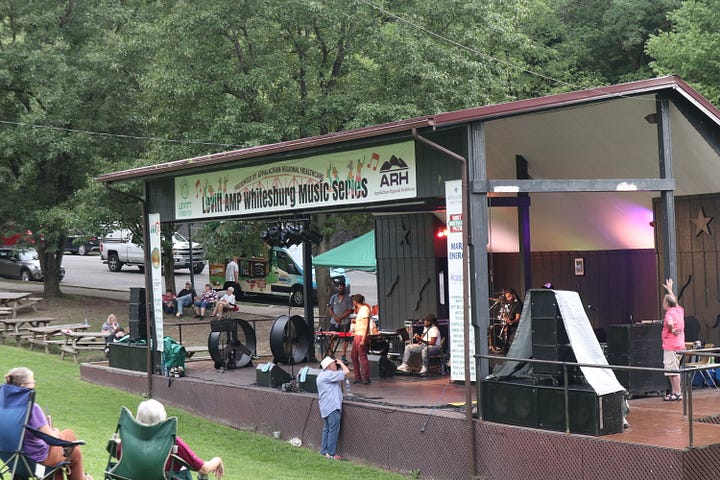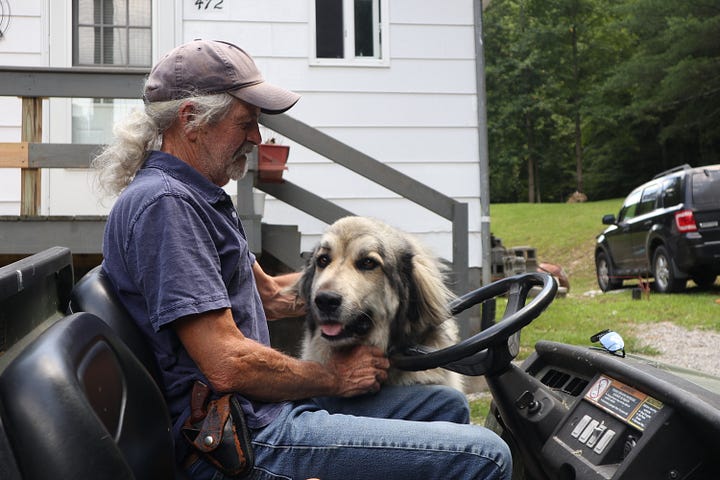Underneath conversations about rural poverty, for instance in West Virginia’s former and current coal country, there floats a question (sometimes voiced aloud): why don’t they just leave? There’s a couple short answers, one of which is the myth that stuck around coal country after the massive mine layoffs in 2008 and 2012 (one famously preached by Donald Trump) that coal would be back, that the industry was just dormant. The long answer is so long that I don’t know how many people would care to stick around for the end of the conversation. One of my interviewees described West Virginia as a “closed society,” and despite the cultish sound of that phrase I think what he was getting to is the intense family ties that exist in the mountainous areas of the state that are not the easiest to access, places that were originally subsistence farms. Two of the folks I interviewed at Sweet Springs last week were neighbors and also aunt-and-nephew by marriage. It’s possible that the long history of the multi-generational family homesteads that line these mountains is what gives rise to the myth that West Virginia’s family trees are especially inbred. The memoir author leading my workshop at the Appalachian Writer’s Workshop this week recalled meeting a series of big publishing house editors when she was selling her memoir, many of whom tried to charm her by insulting her—a fun move that folks tend to pull on rural people for some demented reason. This particular editor joked that her family tree must look like a telephone pole—cue audible gasps in the workshop room. I cannot fathom saying such a thing to anyone, much less a woman whose book you are bidding to buy. I have pet theories—as do Appalachian Studies scholars—about why it’s still socially acceptable or desirable to crap on people who live in rural places, but maybe that will become another blog post—let me know if that sounds interesting.
But back to the actual topic at hand, which is family and kin and land. Last night, one of the visiting authors at this conference read a passage from his novel about a character who is watching people move out of his rural town for lack of jobs. The character blames the economy, he blames the advent of television—there are a litany of proven and suspected whys. But the important takeaway was about how it feels to watch a community fall apart, a community that is threatening to un-exist. People stop talking to each other, retreat into their homes, become bitter about their children leaving, fret over whether anyone will take care of this land after they are gone. Community traditions die, businesses close down. I don’t know how many folks in more populated areas understand what it’s like to be the person who stays, or the person who leaves and then comes back to see things totally changed—last one out, turn off the lights. It’s one thing to move from your hometown or to watch development occur, but another to watch it empty out until the place you are from doesn’t exist. This is maybe akin to—though different in important ways—the emotions associated with one’s hometown being destroyed or irrevocably changed by a natural disaster. What would it be like to not be from anywhere you can prove exists?
Perhaps one reason why the angst of a community experiencing economic and population leakage even needs to be explained is that many of us on the outside looking in have not been “from” one place for a long time. Since telecommunication and travel became much more feasible in the mid 20th century, there is the sense that all of us might go anywhere at any given time, for dream jobs or partners or simply because we’ve grown tired of New York or Houston or Miami and want a change, are convinced we could be someone else somewhere else. The economist E.F. Schumacher calls this recent phenomenon in human history “footlooseness.” We are more mobile than ever, with perhaps a subconscious idea that the places we move should work for us instead of the other way around—like a pair of clothes we could up and shed at any moment. Of course, I’m not suggesting we all move home to the places we grew up ASAP and marry the boy down the street as a way of remedying our flippancy about the meaning of places, but I do believe in making an effort to connect actively, in the specific, with wherever it is we call home, to make sure we know it isn’t just any place. Is there a famous local dive bar that could use your interest, a farmer’s market, a local political race? Do you know the history of the place you live?
I’m currently in Hindman, Kentucky at the aforementioned workshop, writing this in a bathroom because the air conditioning is pleasant in here. And I think part of what has me so interested in writers and scholarship and activism from this region is the attachment and loyalty to the wellbeing of this place exhibited by many of its people, whether or not they still live here and whether or not they had a complicated experience growing up here (for a masterclass in this attachment, read Gay Poems for Red States by Willie Edward Taylor Carver Jr.). People from here pay attention to what happens here. It reminds me a little of the scene from Night at the Museum (stay with me here) where the cowboy played by Owen Wilson says to his friend the Roman centurion, who is injured and has become a burden to him, “I ain’t quittin’ you!” That’s community, that’s place, that’s home.








Good to hear from you - I had forgotten that this was your writing workshop week! Several points resonate with me: 1) what it feels like to be the one left behind in a shrinking community, 2) how thoughtless some people are as they pass judgment or joke about rural or mountain people, as if the people being spoken to aren’t smart enough to know they’re being disrespected!
Good thoughtful work, Hannah!!!
living for the night at the museum ref